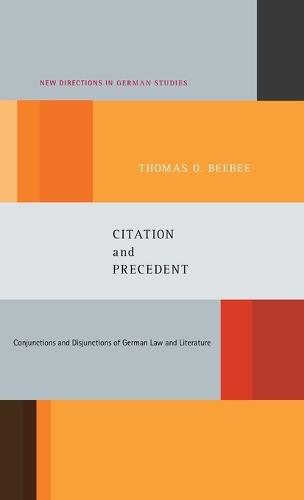
Citation and Precedent: Conjunctions and Disjunctions of German Law and Literature
(Hardback)
Available Formats
Publishing Details
Citation and Precedent: Conjunctions and Disjunctions of German Law and Literature
By (Author) Professor Thomas Oliver Beebee
Continuum Publishing Corporation
Continuum Publishing Corporation
26th January 2012
United States
Classifications
Tertiary Education
Non Fiction
Literature: history and criticism
Literary theory
Legal systems: general
830.93554
Physical Properties
Hardback
296
Width 138mm, Height 216mm
Description
Among Western literatures, only the German-speaking countries can boast a list of world-class writers such as Goethe, Hoffmann, Kleist, Kafka, Schmitt, and Schlink who were trained as legal scholars. Yet this list only hints at the complex interactions between German law and literature. It can be supplemented, for example, with the unique interventions of the legal system into literature, ranging from attempts to save literature from the tidal wave of Schund (pulp fiction) in the early twentieth century to audiences suing theaters over the improper production of classics in the twenty-first. The long list of instances where German literature cites law, or where German law serves literature as a precedent, signal the dream of German culture of a unity of interests and objectives between spheres of activity. Yet the very vitality of this dream stems from real historical and social processes that increasingly autonomize and separate these domains from each other.
Beebee examines the history of this dialectical tension through close readings of numerous cases in the modern era, ranging from Grimm to Schmitt.
Reviews
"Kafka, Benjamin, Schmittthat German-speaking writers and thinkers of the early 20th century are obsessed with 'the law' is well-known. Citation and Precedent widens our historical and conceptual perspective. Beebee reconstructs not only a dense intertextual network of law, literature, and philosophy that pervades German culture from Kant to Peter Weiss; he also shows that these crossings and borrowings are driven by the dream, or the nightmare, of a 'culture' capable of uniting law and life, codified norm and everyday reality. This is an excellent book." -- Andreas Gailus, Associate Professor of German, University of Michigan, USA
"Is systems theory (Luhmann) an effective tool for investigating the relationship of law and literature In a series of subtle and imaginative readings of German-language texts and cultural history, Beebee shows how the autonomy and differentiation of systems allows for registering levels of law's and literature's mutual observation that more common theories of representation fail to capture. Especially fascinating are his analyses of Carl Schmitt's self-identification with Melville's Benito Cereno and Peter Weiss's play on the 1960s' Auschwitz trials." -- William Rasch, Professor, Department of Germanic Studies, Indiana University, USA
adds an important facet to the discussion in the field and encourages a more comparative view on this topic. -- Ralph Grunewald, University of Wisconsin-Madison * Monatshefte *
Author Bio
Thomas O. Beebee is Distinguished Professor of Comparative Literature and German, Penn State University, USA. He is the author of Millennial Literatures of the Americas, 1492-2002 (Oxford University Press, 2008), Epistolary Fiction in Europe (Cambridge University Press, 1999), The Ideology of Genre: A Comparative Study of Generic Instability (Penn State Press, 1994) and Clarissa on the Continent: Translation and Seduction (Penn State Press, 1990).
